How Much to Feed 9 Week Old German Shepherd Puppy
Like all dogs, German Shepherds have specific nutritional needs. While it's possible to feed them the cheap, dry kibble found in your local grocery store, that's not the best diet for this loyal, graceful, obedient breed.
But the ideal food might not be the most expensive or fanciest either.
With all these options to choose from and enough slick marketing to make your head spin, how do you pick the right food?
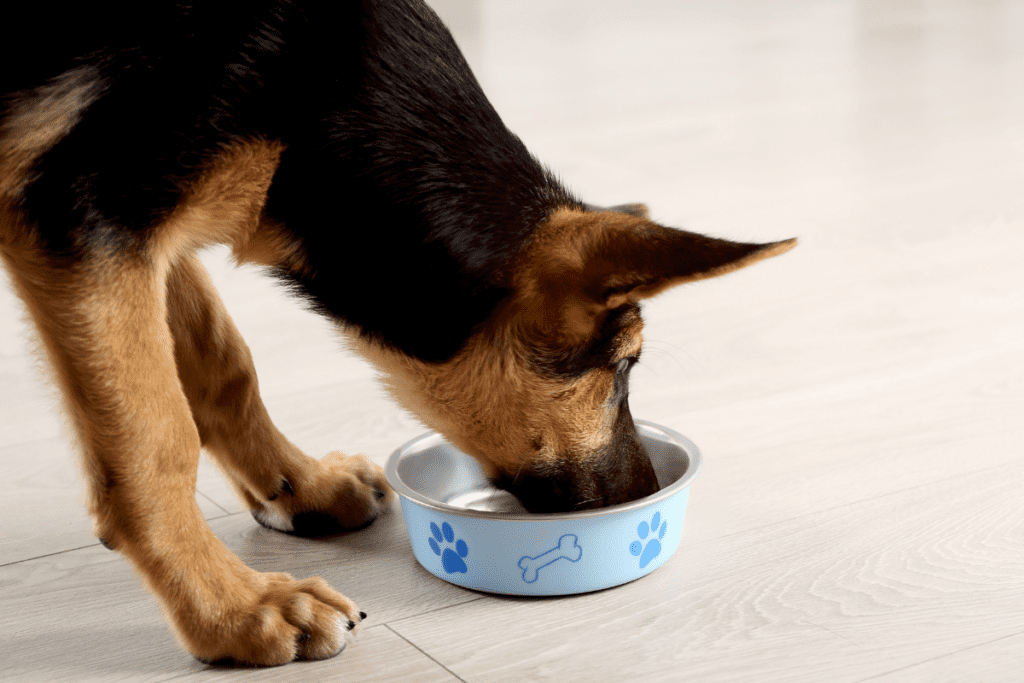
Below, we'll cover the different types of diets available, the specific nutritional needs of the German Shepherd, and what you can do to ensure your GSD gets the delicious and nutritious food they need at every stage of life.
Click Here to Jump to a Section
Nutritional Needs of German Shepherds
All dogs deserve healthy, nutritious, and satisfying food, but generic "dog food" isn't going to be right for most of them. Every breed has its own special dietary needs.
Small dogs, for example, need something totally different than our big, hard-working GSDs.
For maximum health and energy, keep these things in mind when deciding what to feed your German Shepherd.
Size Considerations
According to the AKC breed standard, German Shepherds can be as tall as 26 inches at the shoulder. While males can be around 66 to 88 pounds, females fall into the 49 to 71-pound range.
Though the AKC considers this to be a medium to large breed, in everyday life, that's a pretty big dog, which means it's going to have a big appetite to match.
Don't just stuff your dog full of the cheapest thing you can find—go for the quality products.
Age Considerations
With such a large body and high energy level, it's imperative that you provide your GSD with appropriate nutrition levels at each stage of development.
These dogs grow fast, so they'll need specific nutrients provided at specific times in their lives.
Puppies will need different nutrients—such as protein and calcium—than a senior GSD, for example.
Be sure whatever you're feeding your German Shepherd is not only high-quality and healthy, but it should also be suitable for the age of your dog.
Activity Level
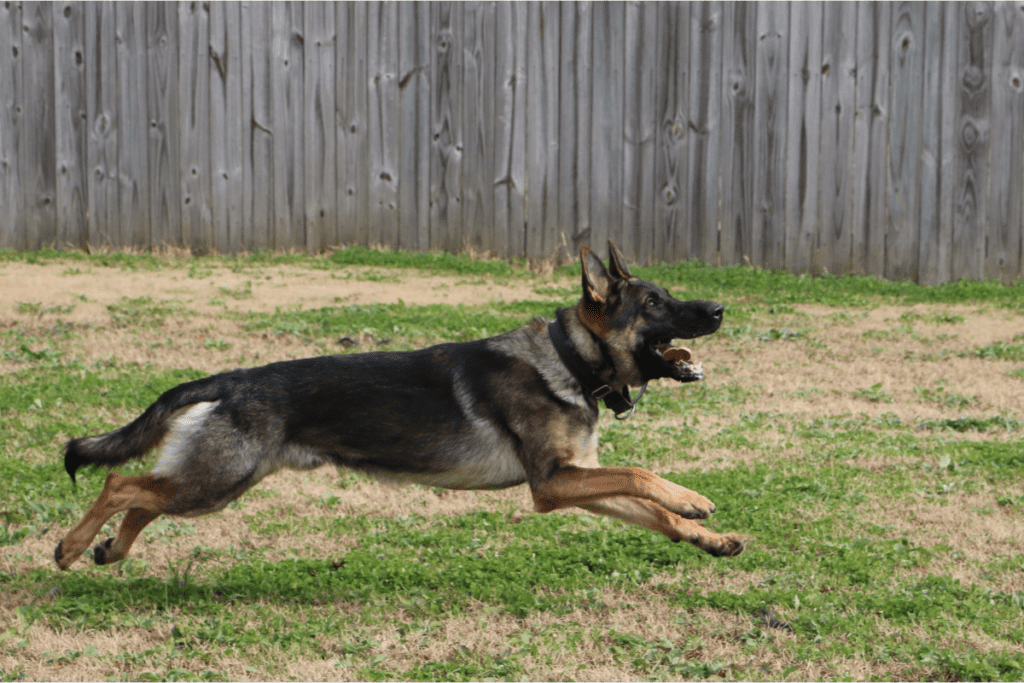
Just as activity level affects how much humans should eat, so too does it affect dogs. As a working breed, German Shepherds are active, muscular, and agile.
All of these aspects contribute to a higher caloric need and should be addressed through the feeding of a high-quality diet.
To put this into perspective, a professional human athlete would not subsist entirely on fast food burgers and soft drinks.
These high fat and sodium foods do not provide the variety of nutrients these athletes need to perform at top capacity.
Cheap, fatty, highly-processed foods produce a sluggish body and mind. The same goes for German Shepherds.
If you want your dog to perform well and stay healthy, you can't feed them the equivalent of fast food burgers and soft drinks in the form of cheap, generic dry kibble every day.
Health Considerations
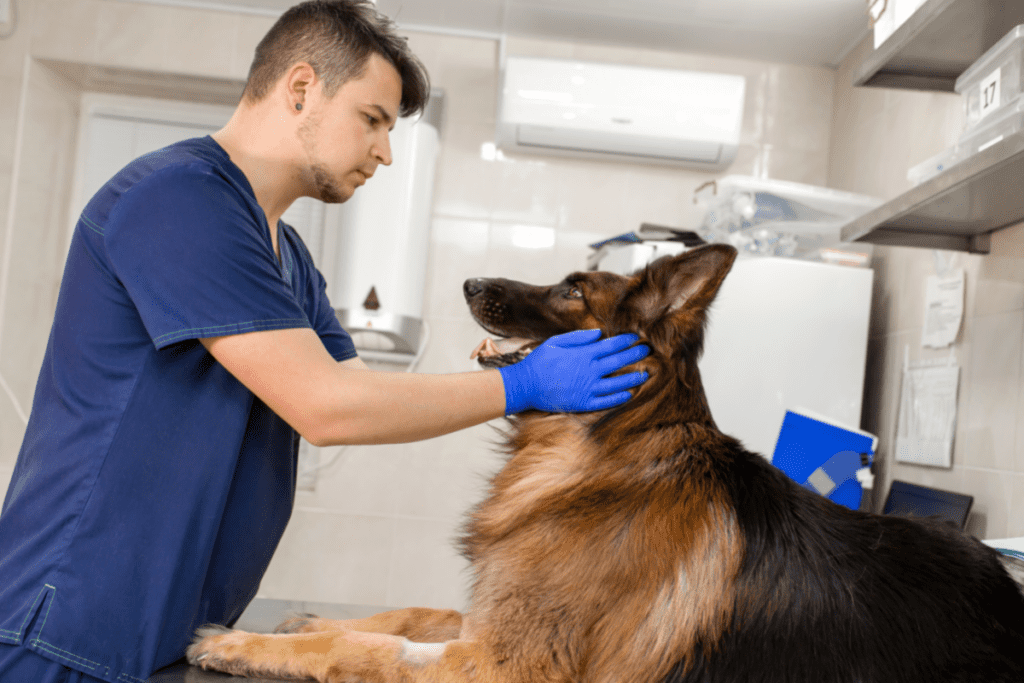
Because this breed is prone to a handful of health issues, it's important to understand each issue and begin preventative treatments through a healthy diet.
It's always better to try preventing problems right from the start rather than waiting until they crop up and trying to treat them.
One such health issue that may be prevented or mitigated by diet is arthritis, often caused by hip or elbow dysplasia.
Since this is generally an inherited predisposition, you may not be able to fully prevent it from happening, but starting with an excellent diet and maintaining it through your dog's life has a good chance of helping.
Several musculoskeletal disorders can cripple your GSD if you don't take appropriate precautionary measures right from day one.
Many of these disorders come from inflammation and malnutrition, including a deficiency in calcium. In fact, the balance between calcium and phosphorus is imperative.
Kidney problems can happen due to an overabundance of protein in the diet, pancreatitis can come from poor-quality foods that are too high in fat, and heart disease can shorten your GSD's life if you feed them too much salt and fat.
These aren't all the health considerations to keep in mind, but you should have a pretty good idea by now of how important nutrition is to your German Shepherd.
Low-quality foods may save you money in the short-term, but in the long run, they could cost you thousands in vet bills and a whole lot of heartache watching your fur baby suffer.
German Shepherd Feeding General Guidelines
Most vets will tell you to watch the dog and not the bowl when deciding how much to feed a German Shepherd.
What they mean by this is that you should always be aware of your dog's body size, shape, and condition, and not being too strict with charts and graphs of food measurements.
If your dog seems to be gaining weight, reduce the number of calories they consume. Start with reducing treats or any table scraps you may be feeding him.
If he is still gaining weight, you can slowly reduce the amount of food you give him during his regular meals.
On the other side of the spectrum, if your dog is overly thin, lethargic, and not doing well, you may be feeding her too little.
Increase the amount of food in each meal by small increments. ¼ cup at a time is usually sufficient.
Do not make drastic changes to your dog's feeding schedule or the amount you give. Do not suddenly remove an entire meal.
All changes to your dog's diet should be made gradually, ideally over the course of several weeks.
Dog Food Measurements
Most commercial dog foods will have some kind of feeding guide on the back of the package. These are just suggestions, however, so don't be too strict on following these guides if your dog isn't responding well.
Generally speaking, adult dogs in ideal health and fitness should be fed approximately this much:
| WEIGHT | AMOUNT |
| 10-30 pounds | 1 ¼ – 2 ¼ cups per day |
| 30-50 pounds | 2 ¼ – 3 ½ cups per day |
| 50-80 pounds | 3 ½ – 4 ½ cups per day |
| 80-100 pounds | 4 ½ – 5 cups per day |
| Over 100 pounds | 5 cups plus ½ cup per additional 10 – 20 pounds of weight |
Remember that these are daily suggestions, not per meal. Split the daily total into as many meals as you plan to feed.
You'll notice these charts have a wide variance in weights and amounts. This is where most of the confusion comes in, and it's also why vets tell you to watch the dog and not the bowl.
It's best to start on the low end of the average and increase the amount as needed. Unless your dog is incredibly active or a working animal, then you should start with the highest amount and lower as needed.
German Shepherd Feeding Guide by Age
As mentioned above, the age and development stage of your German Shepherd will play a big part in what foods are best suited for him.
To make your research easier, we're breaking down the GSD feeding guide into age-based categories. Simply find your dog's age or developmental stage below to find the right information at the right time.
Be sure to check with your vet before beginning, switching, or stopping a feeding program.
The information provided here is for research purposes only. Always take your vet's advice for your individual dog's needs.
German Shepherd Puppy Feeding Guide: Birth to 12 Weeks

All dogs should stay with their mother for no less than eight weeks, ideally up to ten weeks. During this time, the mother will nurse the pups until they are old enough to begin eating puppy mush.
Puppy mush is usually regular dog kibble that's been soaked in water, formula, or homemade "puppy milk" made with human-grade ingredients.
After the puppies are fully weaned from their mother's milk, they will get all of their nutrition either from puppy mush—made progressively drier every few days—or other puppy-safe foods.
It's important to continue feeding your puppy whatever the breeder started them on, at least for the first few weeks. This will help prevent gastrointestinal distress.
Also, be certain it is food intended for puppies and not adults or senior dogs. Adult dog foods do not have the proper nutrients to support a growing puppy.
Once your German Shepherd puppy is home—between 8 and 12 weeks—you may begin weaning them off of the breeder's food and introducing their new food—if you've decided to switch, that is.
Over the course of the next few weeks slowly introduce the puppy's new food into her old food, adding more of the new food each day.
Start with ¾ of the serving of the old food and ¼ of the new food. After a few days, make it half and half. After the first week or so, make it ¾ the new food and ¼ the old food.
Then by two to three weeks, your pup should be fully on her new food.
Puppy Mush Recipe
If you find yourself caring for a puppy before 8 to 10 weeks of age, it might be helpful for you to have a puppy mush recipe. This recipe assumes you have access to suitable dry puppy kibble, water, and/or puppy formula.
- Equal parts boiling water or hot puppy formula and dry puppy kibble
- Place kibble in a glass bowl
- Add boiling water or hot puppy formula
- Stir until all the kibble is wet
- Let stand until the kibble has absorbed all of the liquid—kibble will have grown in size
- Mash the soaked kibble with a fork until no chunks remain
If the puppy doesn't have many teeth yet, add more water or puppy formula to make the mush soupy, like a thin stew. She will be able to lap it up easily. Just be sure it has cooled to body temperature before serving.
If the puppy has all or most of her baby teeth, you may not need to add more liquid after the initial soak.
Just be sure to watch a young puppy at all times when she is eating—puppies are prone to choking or even falling into the food dish and aspirating liquid.
Feed a young puppy four to six times per day, according to your vet's recommendations. Allow the puppies to eat as much as they like at each meal.
A fully fed young puppy will have a round, firm, warm belly. There is no reason to limit food intake at this age.
German Shepherd Puppy Feeding Guide: 12 Weeks to 6 Months

After approximately 12 weeks of age, puppies can be trained to eat fewer meals a day, at set times, and with set amounts.
While you still don't want to limit their food too much at this age, it's also not a good idea to just let them pig out whenever they want.
Large breed puppies have a tendency to overeat, and concerned puppy parents often give in to their pup's cries for more.
This sets your German Shepherd up for obesity, heart problems, liver issues, joint pain, and a host of other medical conditions.
Instead of letting your puppy have a free-for-all on a bag of kibble, ask your vet what they recommend. They'll look at your German Shepherd puppy as an individual as well as considering the breed as a whole.
The vet will also consider the pup's overall health, activity level, and metabolism.
While your vet's recommendation should overrule anything you read online, here is a decent middle ground feeding guide for most German Shepherd puppies.
By 6 months of age, you can reduce the feedings to 3 per day, paying attention to total calories consumed. The caveat to this is if your puppy still looks round and tubby with a potbelly.
This potbelly baby stage means she is not quite mature enough for reduced feedings.
Watch her body composition, shape, and weight. When she starts to look more like an older puppy and the potbelly is slimming down, you can reduce the feedings to 3 per day.
How Much to Feed a German Shepherd Puppy
Depending on your puppy's current weight, activity level, and metabolism, you should plan to feed your puppy 3 or 4 times each day.
Older puppies can be fed fewer times per day, but be sure not to limit the caloric intake below the recommended amount.
Smaller, more frequent meals will help prevent bloat—gastric dilatation volvulus (bloat) is a potentially life-threatening condition.
Frequent meals will also help stabilize your puppy's blood sugar and energy level to help them grow steadily, not in fits and starts.
Puppies need two or three times the number of calories as adult dogs do. This may seem strange considering puppies are much smaller than adults.
However, German Shepherd puppies grow extraordinarily fast, so their caloric intake needs to support that.
To figure out how much to feed your German Shepherd puppy, look at his or her weight. Females will be slightly smaller and lighter than males.
| AGE | WEIGHT |
| 2-3 months | between 11 and 30 pounds |
| 3-4 months | between 17 and 40 pounds |
| 4-5 months | between 31 and 49 pounds |
| 5-6 months | between 35 and 57 pounds |
Using the weight chart above, the general food chart in the previous section, and considering the gender and activity level of your puppy, you can calculate the approximate amount of food to feed daily.
Split that daily amount up between all meals. For example, if your 3-month-old GSD puppy is a male and weighs 30 pounds, you should feed him approximately 2 cups per day.
If he is eating 4 times per day, that would be ½ a cup of food at each of 4 meals.
If he doesn't seem to be gaining weight fast enough or seems to be ravenous at every meal, you can slowly increase the amount of each meal until he stabilizes.
German Shepherd Puppy Feeding Guide: 6 Months to 12 Months
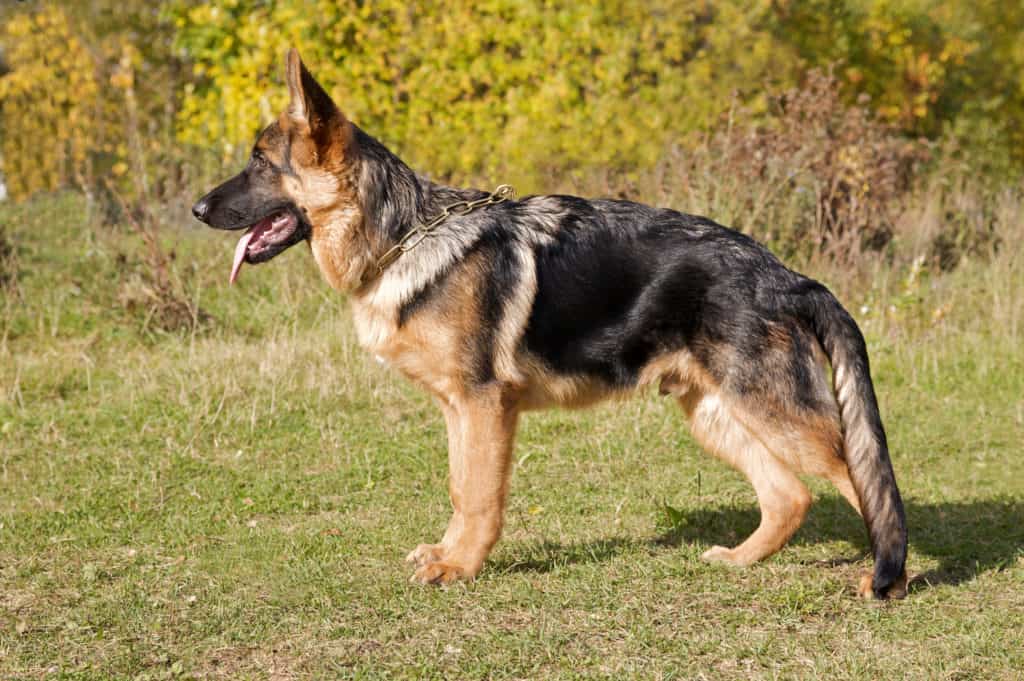
At this stage in your German Shepherd's development, growth will be considerably slower.
Since she no longer needs the extra calories to help support her fast growth period, you can safely reduce her feedings to 2 or 3 meals per day.
You'll still want to watch her weight, health, and activity level, but now you can split her daily total calories over fewer meals.
While she should still be eating puppy food at this point, you may consider purchasing a bag of her eventual adult formula.
You can use individual kibbles from the adult formula for treats or training rewards. This will help her get used to the new flavor and texture.
Around 9 months of age, you can begin slowly adding a small amount of the adult formula into her puppy food, though she should still be eating primarily puppy chow.
By 12 months, it's generally okay to transition fully to an adult formula.
Again, it's imperative that you speak with your vet before making any changes to your GSD's diet.
Only your vet will be able to tell you when your dog has reached maturity and can be safely moved to adult food.
Some GSD's stay on puppy food for a whopping two years! So, make sure you are in close contact with your vet to be sure that your feeding plan is individualized for your specific dog.
German Shepherd Feeding Guide: Adult Years

Once your German Shepherd has ended his puppy stage and transitioned into adulthood, he's ready to eat a balanced adult diet.
Adult dog food will have a different ratio of calcium, protein, phosphorus, and other nutrients than puppy food does.
Feeding an adult dog a puppy formula can cause obesity as well as put too much strain on kidneys and other vital organs. Long term use of inappropriate food for an adult dog can have catastrophic consequences.
That said, there is no need to panic if your adult GSD eats a bowl of puppy food now and then.
Adult German Shepherds should be fed twice a day. They can get by on once per day, but it's always better to split daily caloric intake between smaller meals instead of feeding it all at once.
Again, bloat is a real problem for large breed dogs, and large meals seem to be a big cause of this.
If you're not home for twice-daily feedings, you can use an automatic feeder. These will dispense the proper amount of food at set times each day so your dog isn't left waiting for meals.
Throughout the years, I've fed a number of different high-quality dog foods to my German Shepherds.
One of my consistent go-to's is Royal Canin Adult Breed German Shepherd dry dog food. I feed my adult dogs this particular blend for a number of reasons.
The blend is designed specifically with German Shepherds in mind, as it uses high-quality, animal-based nutrients to counter the extra stress put on the joints of GSDs and to help the development strong lean muscle to keep your dog in peak physical condition.
Royal Canin German Shepherd Adult Breed Specific Dry Dog Food, 30 pounds. bag
- Royal Canin German Shepherd Adult dry dog food is designed to meet the nutritional needs of purebred German Shepherds 15 months and older
- Exclusive kibble shape designed specifically for a German Shepherd's long, strong muzzle to encourage chewing
- Aids digestive health with highly digestible proteins and specific fibers to promote optimal stool quality
- Supports healthy skin and coat with EPA and DHA from fish oil and reinforces the skin barrier with essential nutrients
- Maintains bone & joint health with glucosamine and chondroitin to support large, strong bodies
In addition, this blend also uses optimal levels of omega-6 and omega-3 fatty acids to make a GSD's coat "pop," so to speak. You really can see the difference.
German Shepherd Feeding Guide: Senior Years

Large breed dogs, such as the German Shepherd, age faster than most smaller breed dogs.
This is evident by the fast decline in health, joint flexibility, and energy in older large breed dogs compared to same-age smaller breeds.
Because of this, it's important for your dog's longevity and happiness to pay attention to signs of aging. When your GSD moves from the adult life stage to senior, you need to adjust her diet.
Large breeds reach the older stage (not quite senior, but close) around half of their assumed life expectancy.
A German Shepherd's life expectancy is anywhere from 10 to 15 years, which means they'd be considered older and borderline senior at around 5 or 6.
This is a good time to ask your vet if you should make any changes to her diet or if it's okay to continue with her normal adult meals.
Inevitably, your GSD will need to switch over to a senior diet. Older large breed dogs have lower energy needs. They move slower or less overall and therefore won't need as many calories each day.
Older dogs also tend to slow down their digestion, so an increase in fiber might be a good choice for your senior GSD.
Since the calories in senior-specific dog food have already been adjusted, you'll likely still be feeding the same measured amount based on your GSD's weight.
Do be sure to confirm this with your vet, however. Not all foods are created equal.
For treats, senior dogs should avoid calorie-dense milk bones and high-salt or fatty treats. Opt for healthy, whole-food treats such as apple slices or carrots.
Some senior dogs begin to develop health conditions that will require special care. This is often a result of poor nutrition early in life, but can sometimes simply be genetics and old age catching up with them.
It's never too late to start a healthy, low fat, low sodium, and nutrient-dense diet for a GSD. But for GSDs with health issues such as kidney disease and joint pain, diet can play an even bigger role in the quality of their lives.
Tips for Feeding a German Shepherd Dog
You can find a ton of dog feeding guides online, and while they each hold merit, it's best to talk to your vet about your dog's specific feeding needs.
Getting a personalized recommendation from your veterinarian is worth the time, expense, and effort. That said, there is still plenty of good information in this article that should give you an idea of your dog's nutritional needs at each stage of life.
It's likely that your vet will give you plenty of options, including suggesting you follow this guide and make small adjustments as needed.
What About the Chart On Dog Food Bags?
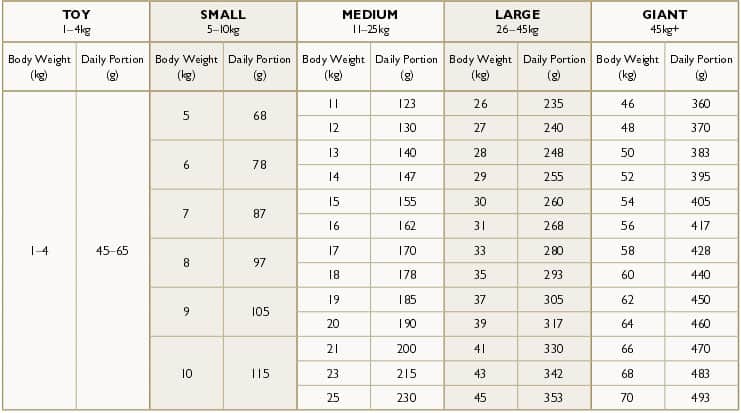
You've likely seen the feeding chart on the back of commercial dog food bags. These charts can seem pretty straightforward at first glance.
However, they don't take into consideration the size, weight, activity level, or overall health of each individual dog.
For that reason, it's best not to treat these dog food packaging feeding guides as gospel. Instead, use them as a starting point.
Observe your dog, see how he looks and feels, and note any changes in his bathroom habits, weight, or energy level. Adjust his meals accordingly.
The other problem with these packaging guides is that they aren't clear on how to feed your dog. Generally speaking, they talk about daily intake, not per meal.
For example, if the guide says you should feed your dog 3 cups, it's not suggesting that your dog eats 3 cups at every meal. It means to split that 3 cups total over the entire day.
If your dog eats 3 times per day, that would be 1 cup at each meal for a total daily intake of 3 cups.
To further confuse dog parents, some manufacturers do list per-meal serving sizes, not the total daily intake! In these cases, if you read it incorrectly, you would end up underfeeding your dog.
To help mitigate some of this confusion, it may be helpful to ask your vet how many calories your dog should be consuming each day.
Then you can check the calorie content in the dog food and measure things from there.
Raw Diets, Cooking for Dogs, and Other Alternative Feeding
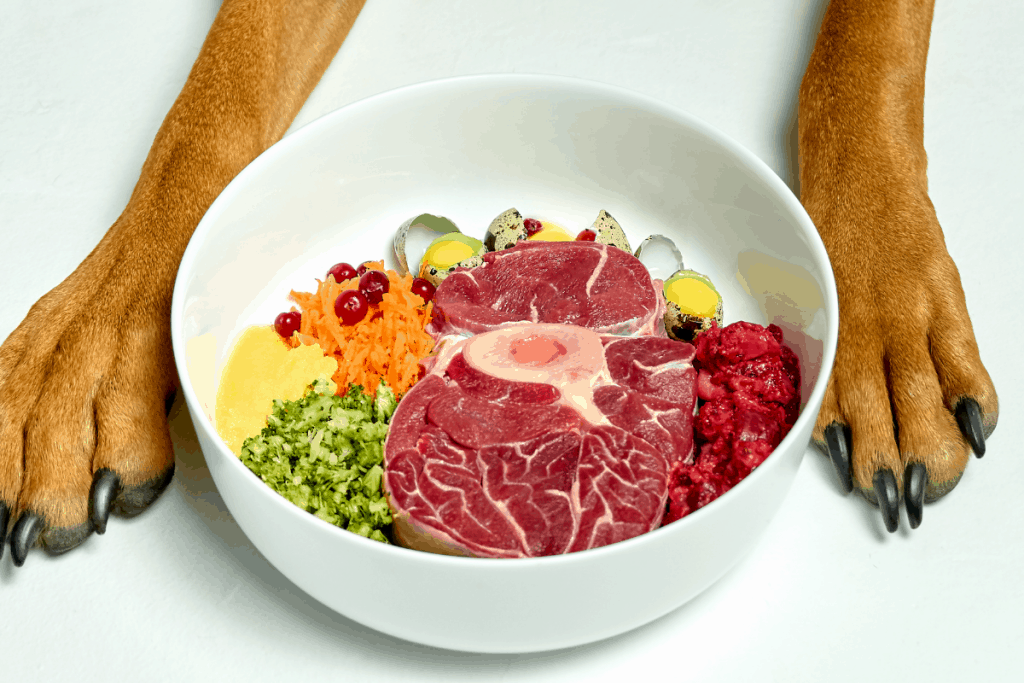
This article has been focusing mainly on commercially available dry kibble since that is what most pet parents ultimately choose for their dogs.
However, there are many dog owners that choose to feed alternative diets. These include raw diets and cooking regular people food for dogs.
There are many viable options for feeding your healthy German Shepherd, but there are just as many harmful fads, too.
As with commercial foods, be sure to speak with your vet before starting your dog on a raw diet or home-cooking her meals.
What's healthy for humans isn't usually healthy for dogs.
That means you'll need to learn a lot about canine metabolism, life stages, and nutritional needs before you embark on that journey.
We've covered the holistic diet approach right here if you're interested in learning more.
Feeding your dog an alternative diet can be a fun way to bond with your pup and feel good about providing whole, nutritious, natural foods that support your GSD's health and wellness.
Supplements for German Shepherds
The vast majority of commercially available dry kibble is complete and balanced for your dog, assuming it's a high-quality food.
That means there is almost never a reason to supplement your dog's diet with additives, vitamins, or herbal supplements. In fact, adding these things to a healthy dog's diet can cause a lot of harm.
Never supplement your dog's diet unless directed by a veterinarian. In those cases, they will prescribe or suggest canine-safe products to cover your GSD's special needs.
Human supplements are often unregulated, minimally effective, and often contain substances harmful to animals. Never use a human supplement for your German Shepherd.
Final Thoughts
What you feed your German Shepherd is just as important as how much you feed them. High-quality foods will have meat listed as the first ingredient, little to no "animal bi-products", and low grain content.
Pay special attention to the first 4 or 5 ingredients listed on the back of the packaging. If you wouldn't eat it, why should your dog?
Choose high-quality, safety-tested foods with clear ingredient and nutrition labels. While this often comes with a bigger price tag than cheap, generic food, it is an investment in your dog's health, wellness, and happiness.
We think that's priceless!
Source: https://thegermanshepherder.com/german-shepherd-feeding-guide-all-you-need-to-know/
0 Response to "How Much to Feed 9 Week Old German Shepherd Puppy"
Enviar um comentário